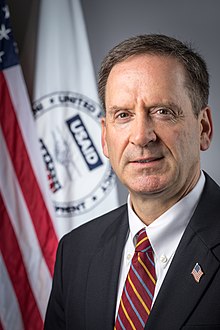USAID Administrator Green Announces Launch of Smart Communities Coalition with Private Sector Partners at the World Economic Forum in Davos
The coalition, specifically working with USAID’s Power Africa initiative, aims to transform refugee settlements into digitally-connect communities. The project will utilise Mastercard’s existing research into settlements to introduce internet and mobile connectivity, access to clean and efficient energy, and digital financial tools.
“We want to tap into the entrepreneurship and creativity and ingenuity of the private sector by going beyond contracting and grantmaking,” USAID Administrator Mark Green said. USAID will move toward co-designing, co-creating, and co-financing solutions in order to engage business, allowing the agency to come up with the best solutions.
In his conversations at Davos, Green said that the business community has responded well to his focus on changing how USAID engages with them, and understand the agency is “very much interested in true collaboration.”
USAID will use existing mechanisms, some of which haven’t previously been used as often, to engage with the private sector, including grand challenges and the use of broad agency announcements. USAID released a BAA last year to tackle the voluntary return of internally displaced people in Iraq.
Green also highlighted an increase use of innovative financing mechanisms, pointing to the Utkrisht Impact Bond, which tackles maternal child health in India, and the Smart Communities Coalition, which will work to address internet connectivity, digital payments, and energy access in refugee settlements.
His trip comes less than a month before the administration’s budget is expected to be released. Those with knowledge of the matter anticipate significant cuts to the aid budget, but neither the budget nor the reorganization process will be significantly impacted by increased private sector engagement, Green said.
United States Agency for International Development (USAID) Administrator Mark Green and Mastercard Executive Vice President of Public-Private Partnerships Tara Nathan co-chaired the launch of the Smart Communities Coalition (SCC) today at the World Economic Forum in Davos. SCC will address technology challenges that refugees and host communities face, and increase their Internet connectivity, digital-payment capabilities, and energy access within refugee settlements. SCC will improve camp-management and service delivery, and help empower refugees to provide for themselves and their families.
Power Africa, a U.S. Government-led initiative coordinated by USAID, will spearhead efforts to provide energy access to refugees in a more cost-efficient manner. Within SCC, USAID’s Global Development Lab and other partners will increase Internet and mobile connectivity.
SCC’s private sector partners, such as Mastercard, will bring their payments technology and expertise to create efficiency, transparency, and accountability with new financial tools for refugees and the surrounding communities to give them a safe and secure way to access and pay for services like electricity, Internet, and school fees.
Additionally, USAID’s Innovation Design and Advisory team, whose mission is to mainstream the use of innovative program design methodologies in development practice, will support SCC’s core team by providing specialized advisory services. They will help develop the collective-action coalition, structure and facilitate collaborative design workshops and decision-making, and support user-centered design and testing processes in the field to help teams learn and adapt solutions along the way.
Along with Power Africa, the following SCC participants have generously pledged their support: Mastercard (co-chair); Accenture; Acumen; BRCK; Chatham House; Danish Refugee Council; Energy Peace Partners; Fenix International; GSMA; The Innovation Village; Lutheran World Federation; Mercy Corps; Microsoft; Moving Energy Initiative; NetHope; Norwegian Refugee Council; Off-Grid Electric; Pawame; PowerGen Renewable Energy; SolarKiosk; Tent Partnership for Refugees; the USAID Global Development Lab/Digital Inclusion; the U.S. Department of State’s Bureau of Population, Refugees, and Migration; Vecna Cares Charitable Trusts; and World Vision.
In 2018, SCC will launch in targeted refugee camps and host communities in Kenya and Uganda.
